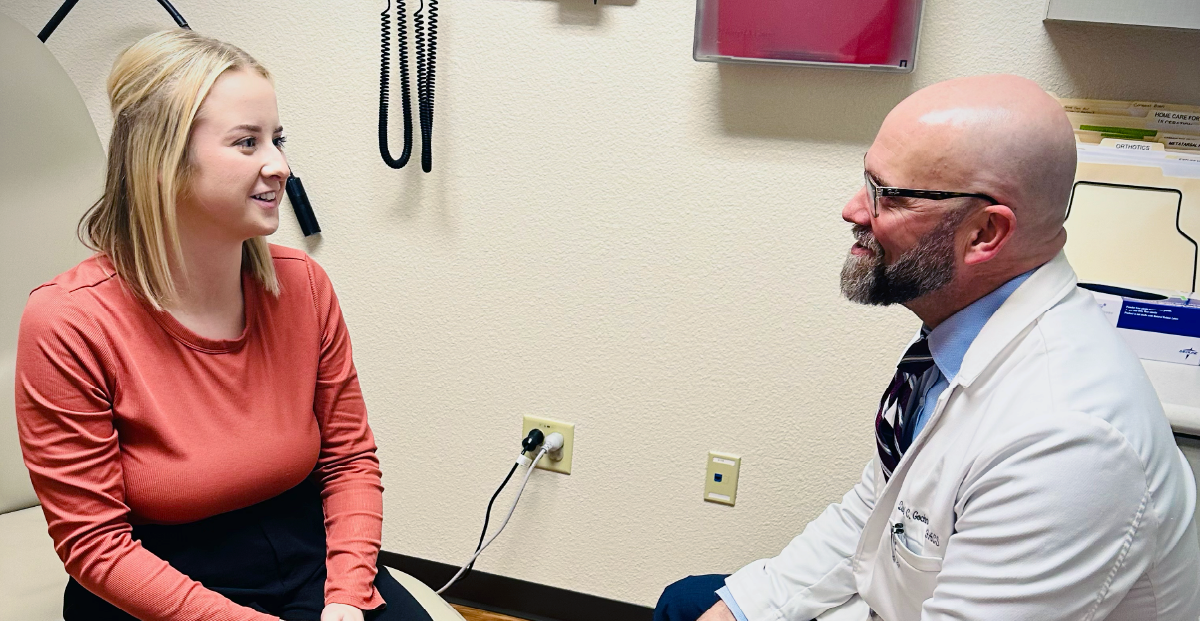
May 16, 2024
Surgical Weight Loss Advice from an Expert
Are you struggling in your weight loss journey? Not enjoying your once-favorite activities due to a lack of energy? Not sleeping well? Bariatric surgery can be the solution.
In our Q&A interview, board certified bariatric surgeon Dr. David Gochnour answers common questions surrounding bariatric surgery and offers invaluable insights and clarity to those considering this step toward improved health and well-being.
What is Ozempic?
Dr. Gochnour: Ozempic is an injection that was approved for the management of diabetes by the FDA in 2017. While developing the drug, Novo Nordisk also observed notable weight loss results in their patient studies. Ozempic is what we call a GLP-1 agonist. Ironically, we know about GLP-1 agonists through studying bariatric surgery because GLP-1 was an upregulated hormone after patients underwent surgery. GLP-1 agonists have notable effects on our metabolic profiles. They help to increase satiety, decrease hunger and upregulate other metabolic parameters that all contribute to our energy homeostasis at any given time.
Is Ozempic safe for weight loss?
Dr. Gochnour: Ozempic is safe for weight loss — it’s been well-studied. You can expect approximately 10% of weight loss when you take Ozempic. However, if you weigh 300 pounds and lose 30 pounds, while that will be beneficial, it won’t significantly impact your health and longevity.
Some side effects of Ozempic include nausea, vomiting, diarrhea, changes in bowel habits and feelings of distention or bloating. The most dangerous side effect is when people’s blood sugar drops too low, and it’s a clinically relevant hypoglycemia, which may be deadly.
What is bariatric medicine?
Dr. Gochnour: Bariatric medicine focuses on using medications, such as GLP-1 agonists like Ozempic or Wegovy, to help somebody lose weight. Surgical therapy is a surgical alteration of the gastrointestinal tract that promotes permanent, durable weight loss.
It’s important to remember that both therapies help treat the disease process of obesity. They don’t have to be used separately. You can use medical therapy in conjunction with surgical therapy in order to maximize weight loss results.
Bariatric surgery vs. bariatric medicine — what’s the difference?
Dr. Gochnour: When comparing bariatric medicine with bariatric surgery, it’s important to know that this is a comprehensive approach to a disease process. Both are important when taking care of our patients.
When we look between the two, the biggest difference is effectiveness. Some weight loss medications are really advanced, and we’re getting up to 20-30% of body weight loss, which is outstanding. We’re happy to see that. But when we look at surgical weight loss, it’s pretty common for people to get 65-70% of their excess body weight loss. That sometimes translates to 100, 130 or 140 pounds. As you can imagine, that will go much further toward improving that person’s health and longevity.
The second difference would be durability. With medications, you have to keep taking them to maintain your weight loss. Bariatric surgery is much more durable. It’s a permanent procedure that creates the same desired weight loss effects for the remainder of your life.
A third factor is cost. Unfortunately, a lot of these newer medications can be very expensive. It can be hard to get approved by your insurance company, so some people are spending $500-$800 a month on these weight loss medications. Even if someone had to pay a cash fee for their surgical weight loss, there’s a much larger cost saving over time. Once that cost is incurred, you’re done.
Whether a patient’s looking at medically supervised weight loss with medications or surgical therapy, it’s imperative to understand that these are just tools to augment healthy lifestyle habits like diet and exercise. That doesn’t mean you have to rip your sleeves off your shirt and join a CrossFit gym, but it does mean that you have to practice daily active living and exercise habits. When we eat, we have to focus on eating high-quality, nutritious foods in the proper proportions.
What are the requirements for bariatric surgery?
Dr. Gochnour: Most insurance companies will require a patient to have a BMI of 40 or a BMI of 35 with other medical morbidities. The American Society for Metabolic and Bariatric Surgery recently published new recommendations to drop that threshold so that patients with a BMI over 30 with comorbidities or a BMI of 35 with no comorbidities can also access this critical part of healthcare.
Your bariatric surgeon may have requirements such as seeing a nutritionist and getting a mental health clearance. Some bariatric surgeons will perform an upper endoscopy to evaluate the upper gastrointestinal tract before surgery. At most, you will undergo a laboratory analysis before proceeding with surgery. Insurance companies may have additional requirements like medically supervised weight loss and visits with a nutritionist, primary care physician or surgeon before proceeding with surgery.
Is bariatric surgery safe?
Dr. Gochnour: When we started performing bariatric surgery, many people considered this to be a low-volume, high-risk procedure. With technological advancement and the modernization of our procedures, the bariatric process has become a high-volume, low-risk procedure.
For instance, the mortality rate after bariatric surgery is somewhere between .04 and .09%. That’s less than 1 in 1,000 patients. Gallbladder removal, one of the most commonly performed procedures in the United States, has a mortality rate of approximately .15%. By and large, bariatric surgery is one of our safest surgeries.
Risks of bariatric surgery explained
Dr. Gochnour: The complication rate of bariatric surgery is generally less than 5% when well-trained hands perform it with the right technology. We decrease those risks even more using minimally invasive techniques like the da Vinci Surgical System.
The risks of bariatric surgery aren’t any different than any other surgical procedure we perform. You’re going to have risks like bleeding and infection, although using the minimally invasive techniques that we use decreases those risks exponentially. Some people may not tolerate the changes to the gastrointestinal system as well as others. Still, generally speaking, people will resolve those symptoms and lead very happy and healthy lives.
When you consider obesity and the contributions it makes to the comorbidities and other medical problems that are killing our society, bariatric surgery is a very low-risk, high-reward procedure.
How much does bariatric surgery cost? Is bariatric surgery covered by insurance?
Dr. Gochnour: Today, most insurance companies will have bariatric benefits. Now, how much of that cost is borne by the patient? That variable depends on their insurance plan specific to that particular insurance company.
When people don’t have the insurance coverage for bariatric surgery, it’s important to recognize the profound cost savings over time. This has been studied at length, and millions of dollars are saved in total life healthcare after bariatric surgery.
Is getting bariatric surgery in another country like Mexico safe?
Dr. Gochnour: There are fantastic surgeons around the world, including in Mexico or other places where people will usually go to seek surgery when they’re looking for more affordable options than here at home. However, you have to ask yourself these questions:
- “Do I know that they’re a fantastic surgeon or not?”
- “Who’s going to do my follow-up?”
- “Who am I going to call if I have a problem?”
- “What’s going to happen if I start gaining weight? Who will I go to?”
The problem with medical tourism is you don’t have the coaching or mentorship that comes with an established, comprehensive bariatric surgical program.

Dr. David Gochnour specializes in minimally invasive bariatric surgery using a da Vinci robot. He decided to specialize in surgery after witnessing how surgery can change patients’ lives for the better, and he can change your life, too. To schedule an initial consultation with Coryell Bariatric Medicine, call (254) 404-2500. Visit our bariatric surgery page for more information.

About the Doctor
Dr. David Gochnour earned his bachelor’s degree in biomedical science from Texas A&M University. He attended medical school and completed his residency in general surgery at the University of Texas Health Science Center in Houston. Dr. Gochnour also completed specialty fellowship training in minimally invasive surgery, robotics and bariatric surgery at UTHSC. Dr. Gochnour is a fellow of the American College of Surgeons and the American Society for Metabolic and Bariatric Surgery.

 Skip to content
Skip to content
